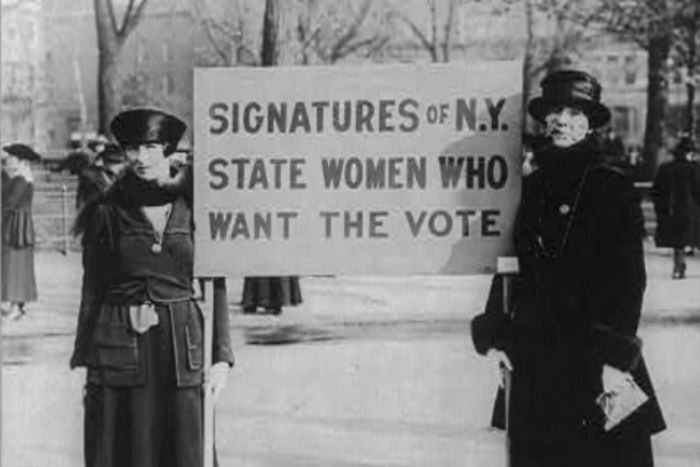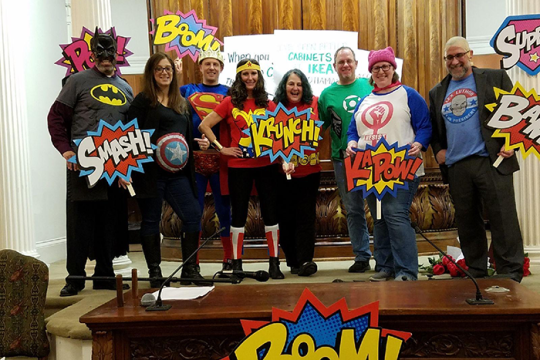
Amidst nationwide protests and a historic election, we must remember women’s right to vote was not granted, rather it was fought and protested for. It was only after 150 years and persistent advocacy from suffragists that the women finally secured the right to vote with the 19th Amendment. Now, 100 years later, as we celebrate the centennial of this momentous occasion, we must also remember the women who the suffrage movement and the 19th Amendment left behind.
Suffragists began working forcefully towards achieving the right to vote for women beginning with the Seneca Falls convention in 1848. State-by-state, beginning with Wyoming in 1869, women began to move the needle towards full suffrage. Eventually, Congress passed the 19th Amendment on June 4, 1919. It was ratified on August 18, 1920 when Tennessee became the 36th state to vote for ratification. The amendment extended the right to vote regardless of sex, stating “The right of citizens of the United States to vote shall not be denied or abridged by the United States or by any state on account of sex.”
The women’s suffrage movement emerged at the same time Reform Jewish women were organizing within their own synagogues and communities. The 19th Amendment passed just six years after the National Federation of Temple Sisterhoods (NFTS), now Women of Reform Judaism (WRJ) was formed. Many of the earlier leaders of the NFTS were active in the suffrage movement, including Bertha Born, Jean Wise May, and Pauline Perlmutter Steinem, Gloria Steinem's grandmother. These women understood their work of expanding the role of women within the Reform Movement as deeply connected to the nationwide movement to expand women’s rights (Sisterhood: A Centennial History of WRJ, page 339). Rabbi Carole B. Balin Ph.D. documented the Jewish connection to the suffrage movement and the 19th Amendment in a recent series on ReformJudaism.org.
Despite the passage of Nineteenth Amendment, many women continued to face obstacles trying to vote, specifically low-income women, women with disabilities, and women of color. In practice, the 19th Amendment only granted white women the right to vote. Only after more protests and battles did People of Color, including women, gain access to this fundamental right.
It was not until the Civil Rights Movement four decades later when we saw the 24th Amendment pass, which prohibited poll taxes extending the vote regardless of income and eliminating one of the means of limiting Black voter participation in the South. It was not until the Voting Rights Act of 1965 (VRA), which outlawed discriminatory voting practices, that the United States finally saw the beginnings of enforcement of the right to vote regardless of race enshrined in the 15th Amendment that was ratified 95 years earlier. It was not until 1962 that Native Americans were ensured the right to vote in every state. And it was not until 1975 that amendments to the VRA added protections for citizens who speak minority languages.
And yet, even after all these laws, impediments to the ballot box continue. In the wake of Shelby County v. Holder, which gutted the VRA, states across the country exacerbated their attacks on voting rights. Onerous photo ID requirements, poll closures and restrictions, and other constraints present obstacles to the ballot box that disproportionately impact People of Color. Accessing the ballot has become even more difficult in the middle of the pandemic as states shut down polling places, predominately in Black and Latino neighborhoods, and continue to enforce onerous restrictions on vote by mail.
Pirkei Avot 2:16 teaches, "It is not up to you to finish the work, yet you are not free to avoid it" (translation from Pirkei Avot: A Modern Commentary on Jewish Ethics). The suffragists did not finish the work of voting rights 100 years ago with the passage of 19th Amendment. It is on us to continue the work to ensure that all Americans have access to the ballot box regardless of gender, race, income, or experience with the criminal justice system.
The Reform Jewish Movement is committed to voting rights. Here are ways you can take action today:
- Urge Congress to provide funding for safe, fair, and accessible elections in 2020: RAC.org/VoteSafe
- Join Every Voice, Every Vote: The Reform Movement’s 2020 Civic Engagement Campaign: RAC.org/CEC
- Take on the fight against voter suppression with us and the Center for Common Ground: RAC.org/VoterSuppression
Related Posts

Extraordinary Ordinary Heroes

Women of Valor: Revisiting Biblical Role Models



